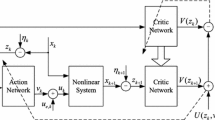Abstract
A novel multi-objective adaptive dynamic programming (ADP) method is constructed to obtain the optimal controller of a class of nonlinear time-delay systems in this paper. Using the weighted sum technology, the original multi-objective optimal control problem is transformed to the single one. An ADP method is established for nonlinear time-delay systems to solve the optimal control problem. To demonstrate that the presented iterative performance index function sequence is convergent and the closed-loop system is asymptotically stable, the convergence analysis is also given. The neural networks are used to get the approximative control policy and the approximative performance index function, respectively. Two simulation examples are presented to illustrate the performance of the presented optimal control method.








Similar content being viewed by others
References
Al-Tamimi A, Lewis FL, Abu-Khalaf M (2007) Model-free Q-learning designs for linear discrete-time zero-sum games with application to H-infi nity control. Automatica 43:473–481
Anguelova M, Wennberg B (2008) State elimination and identifiability of the delay parameter for nonlinear time-delay systems. Automatica 44(5):1373–1378
Bellman RE (1957) Dynamic Programming. Princeton University Press, Princeton
Chen B, Liu XP, Liu KF, Lin C (2009) Novel adaptive neural control design for nonlinear MIMO time-delay systems. Automatica 45(6):1554–1560
Chyung DH (1970) On the controllability of linear systems with delay in control. IEEE Trans Autom Control 15(2):255–257
Chyung DH (1970) Controllability of linear systems with multiple delays in control. IEEE Trans Autom Control 15(6):694–695
Enns R, Si J (2003) Helicopter trimming and tracking control using direct neural dynamic programming. IEEE Trans Neural Netw 14(4):929–939
Fernández-Navarro F, Hervás-Martínez C, Gutierrez PA (2013) Generalised Gaussian radial basis function neural networks. Soft Comput 17:519–533
Fu J, He H, Zhou X (2011) Adaptive learning and control for MIMO system based on adaptive dynamic programming. IEEE Trans Neural Netw 22(7):1133–1148
Gyurkovics É, Takács T (2003) Quadratic stabilisation with H\(\infty \)-norm bound of non-linear discrete-time uncertain systems with bounded control. Syst Control Lett 50:277–289
He P, Jagannathan S (2007) Reinforcement learning neural-network-based controller for nonlinear discrete-time systems with input constraints. IEEE Trans Syst Man Cybern Part B: Cybern 37(2):425–436
He H, Ni Z, Fu J (2012) A three-network architecture for on-line learning and optimization based on adaptive dynamic programming. Neurocomputing 78(1):3–13
Maji K, Pratihar DK, Nath AK (2013) Analysis and synthesis of laser forming process using neural networks and neuro-fuzzy inference system. Soft Comput 17:849–865
Murray JJ, Cox CJ, Lendaris GG, Saeks R (2002) Adaptive dynamic programming. IEEE Trans Syst Man Cybernetics Part C Appl Rev 32(2):140–153
Powell WB (2009) Approximate Dynamic Programming: Solving the Curses of Dimensionality. Wiley, New York
Richard JP (2003) Time-delay systems: an overview of some recent advances and open problems. Automatica 39(10):1667–1694
Richert D, Masaud K, Macnab CJB (2013) Discrete-time weight updates in neural-adaptive control. Soft Comput 17:431–444
Si J, Wang YT (2001) On-line learning control by association and reinforcement. IEEE Trans Neural Netw 12(2):264–276
Song R, Xiao W, Zhang H (2013) Multi-objective optimal control for a class of unknown nonlinear systems based on finite-approximation-error ADP algorithm. Neurocomputing 119:212–221
Vamvoudakis KG, Lewis FL (2010) Online actor-critic algorithm to solve the continuous-time infinite horizon optimal control problem. Automatica 46(5):878–888
Vrabie D, Pastravanu O, Abu-Khalaf M, Lewis FL (2009) Adaptive optimal control for continuous-time linear systems based on policy iteration. Automatica 45(2):477–484
Wang FY, Jin N, Liu DR, Wei QL (2011) Adaptive dynamic programming for finite horizon optimal control of discrete-time nonlinear systems with \(\varepsilon \)-error bound. IEEE Trans Neural Netw 22(1):24–36
Wang D, Liu D, Wei Q, Zhao D, Jin N (2012) Optimal control of unknown nonaffine nonlinear discrete-time systems based on adaptive dynamic programming. Automatica 48(8):1825–1832
Wei Q, Zhang H, Dai J (2009) Model-free multiobjective approximate dynamic programming for discrete-time nonlinear systems with general performance index functions. Neurocomputing 72(7–9):1839–1848
Wei Q, Liu D (2012) An iterative \(\epsilon \)-optimal control scheme for a class of discrete-time nonlinear systems with unfixed initial state. Neural Netw 32:236–244
Werbos PJ (1977) Advanced forecasting methods for global crisis warning and models of intelligence. General Syst Yearbook 22:25–38
Zhang H, Wei Q, Luo Y (2008) A novel infinite-time optimal tracking control scheme for a class of discrete-time nonlinear systems via the greedy HDP iteration algorithm. IEEE Trans Syst Man Cybern Part B Cybern 38(4):937–942
Zhang H, Luo Y, Liu D (2009) Neural-network-based near-optimal control for a class of discrete-time affine nonlinear systems with control constraints. IEEE Trans Neural Netw 20:1490–1503
Zhang HG, Song RZ, Zhang TY (2011) Optimal tracking control for a class of nonlinear discrete-time systems with time delays based on heuristic dynamic programming. IEEE Trans Netw 22(12):1851–1862
Zhang HG, Wei QL, Liu DR (2011) An iterative adaptive dynamic programming method for solving a class of nonlinear zero-sum differential games. Automatica 47(1):207–214
Zhang H, Wei Q, Liu D (2011) An iterative adaptive dynamic programming method for solving a class of nonlinear zero-sum differential games. Automatica 47(1):207–214
Zhang X, Zhang H, Sun Q, Luo Y (2012) Adaptive dynamic programming-based optimal control of unknown nonaffine nonlinear discrete-time systems with proof of convergence. Neurocomputing 91:48–55
Zheng C, Jagannathan S (2008) Generalized Hamilton-Jacobi-Bellman formulation-based neural network control of affine nonlinear discrete-time systems. IEEE Trans Neural Netw 19(1):90–106
Acknowledgments
This work was supported in part by the Open Research Project from SKLMCCS (20120106), the Fundamental Research Funds for the Central Universities (FRF-TP-13-018A), the China Postdoctoral Science Foundation (2013M530527), and the National Natural Science Foundation of China (61304079).
Author information
Authors and Affiliations
Corresponding author
Additional information
Communicated by C. Alippi, D. Zaho and D. Liu.
Rights and permissions
About this article
Cite this article
Song, R., Xiao, W. & Wei, Q. Multi-objective optimal control for a class of nonlinear time-delay systems via adaptive dynamic programming. Soft Comput 17, 2109–2115 (2013). https://doi.org/10.1007/s00500-013-1111-x
Published:
Issue Date:
DOI: https://doi.org/10.1007/s00500-013-1111-x




